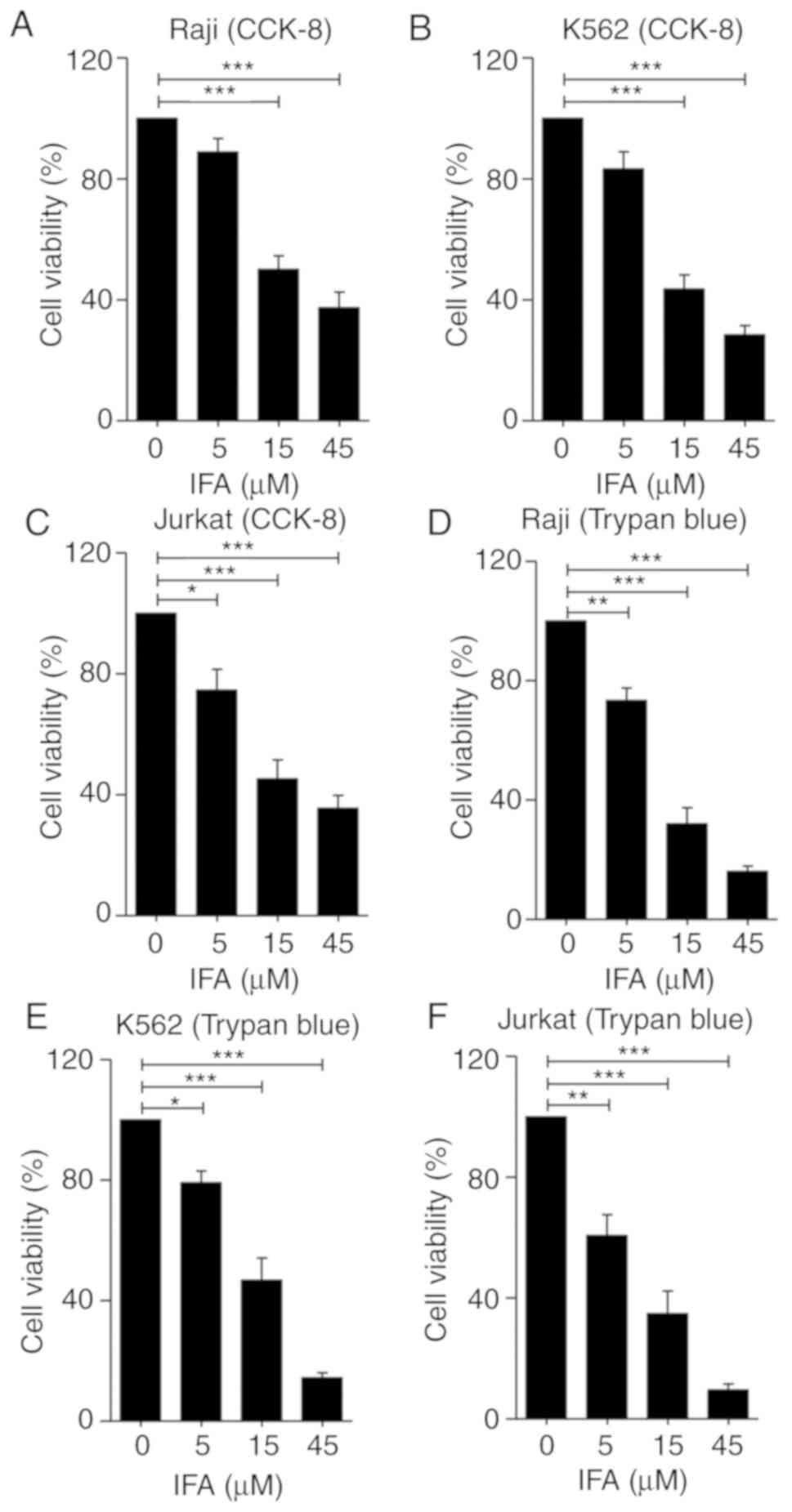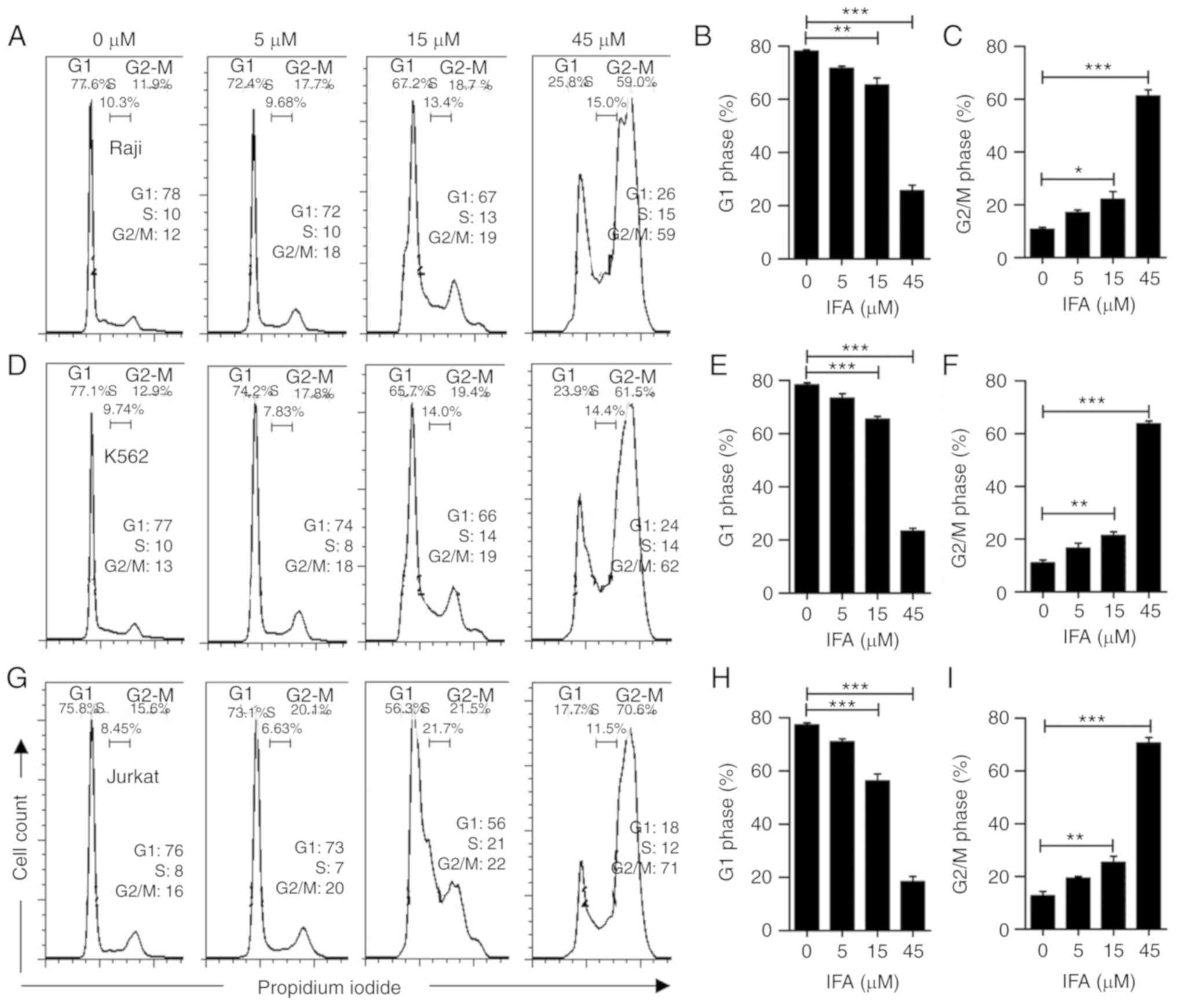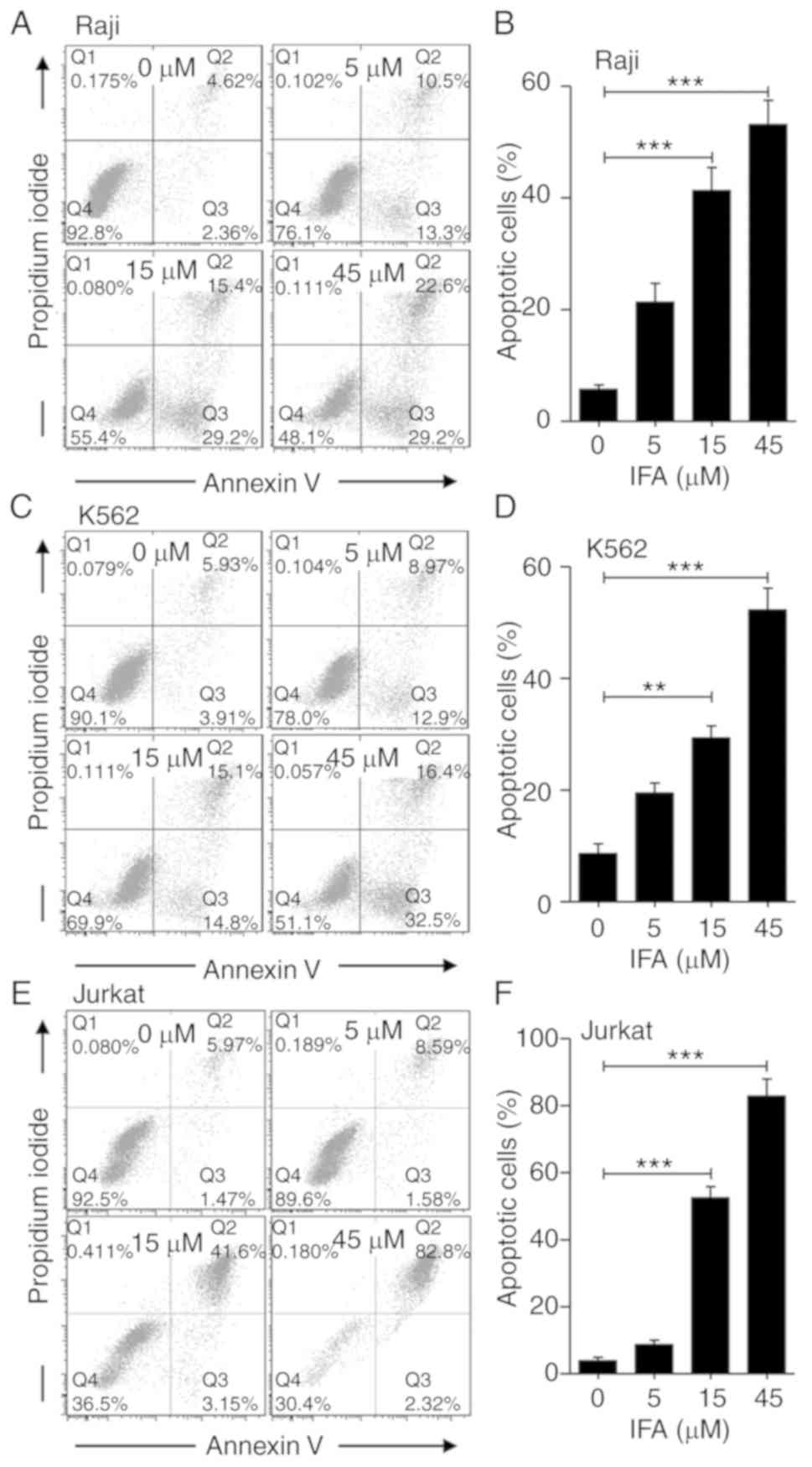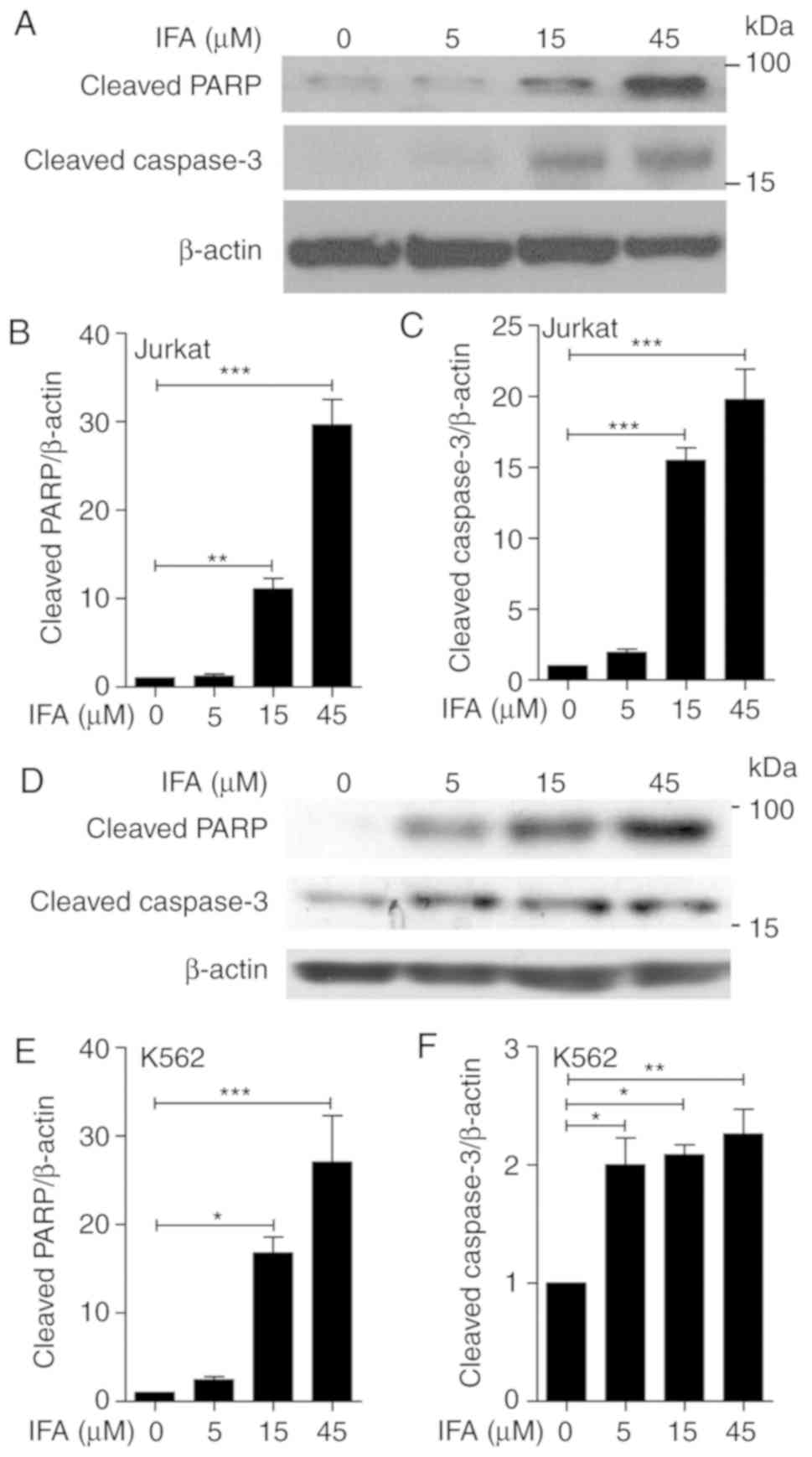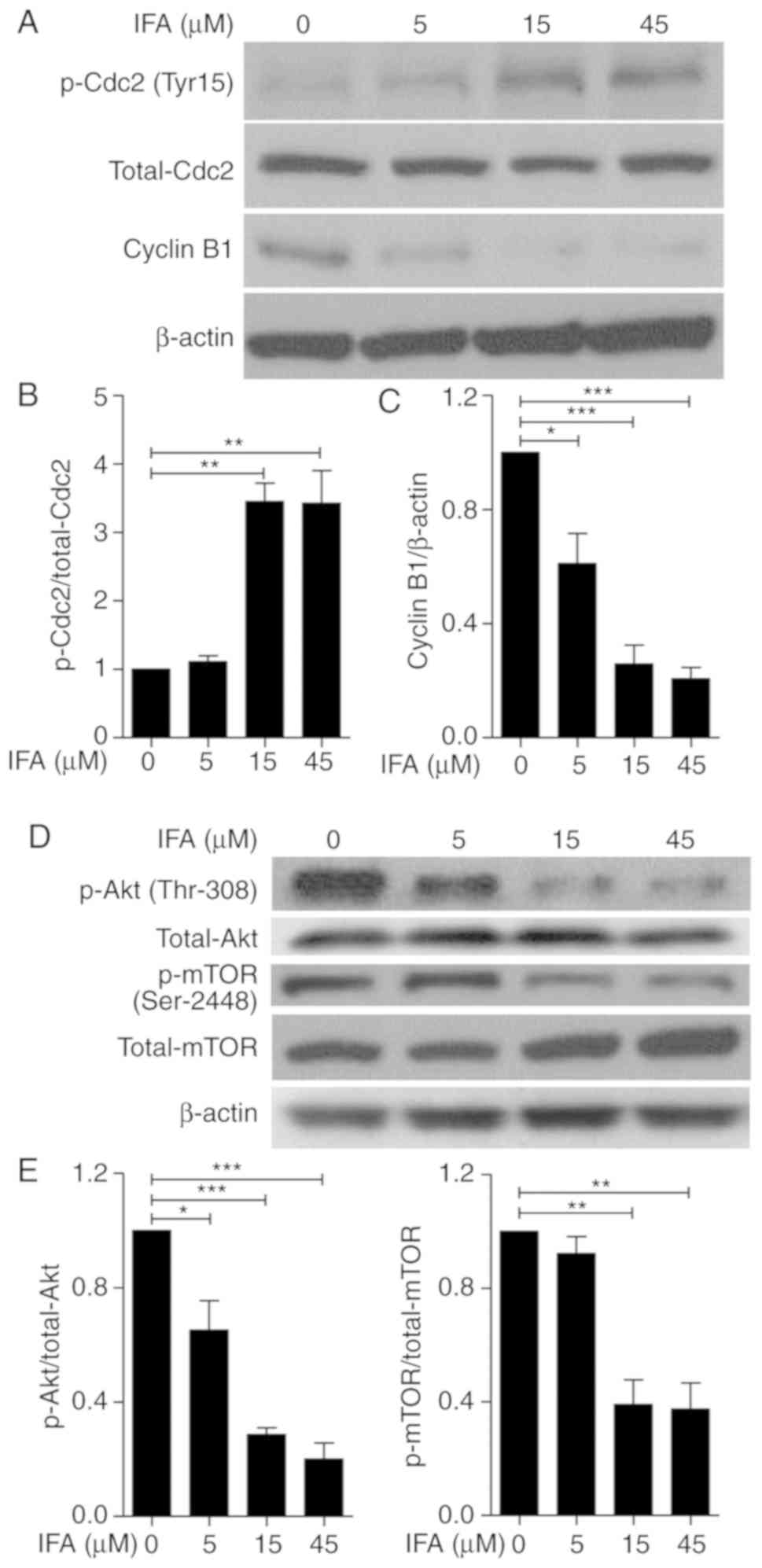|
1
|
Durinck K, Goossens S, Peirs S, Wallaert
A, Van Loocke W, Matthijssens F, Pieters T, Milani G, Lammens T,
Rondou P, et al: Novel biological insights in T-cell acute
lymphoblastic leukemia. Exp Hematol. 43:625–639. 2015. View Article : Google Scholar : PubMed/NCBI
|
|
2
|
Egler RA, Ahuja SP and Matloub Y:
L-asparaginase in the treatment of patients with acute
lymphoblastic leukemia. J Pharmacol Pharmacother. 7:62–71. 2016.
View Article : Google Scholar : PubMed/NCBI
|
|
3
|
Liu XY, Yang YF, Wu CT, Xiao FJ, Zhang QW,
Ma XN, Li QF, Yan J, Wang H and Wang LS: Spred2 is involved in
imatinib-induced cytotoxicity in chronic myeloid leukemia cells.
Biochem Biophys Res Commun. 393:637–642. 2010. View Article : Google Scholar : PubMed/NCBI
|
|
4
|
Nilsson C, Hulegårdh E, Garelius H,
Möllgård L, Brune M, Wahlin A, Lenhoff S, Frödin U, Remberger M,
Höglund M, et al: Secondary acute myeloid leukemia and the role of
allogeneic stem cell transplantation in a population-based setting.
Biol Blood Marrow Transplant. 25:1770–1778. 2019. View Article : Google Scholar : PubMed/NCBI
|
|
5
|
Han C and Kwon BS: Chimeric antigen
receptor T-cell therapy for cancer: A basic research-oriented
perspective. Immunotherapy. 10:221–234. 2018. View Article : Google Scholar : PubMed/NCBI
|
|
6
|
Pui CH, Relling MV and Downing JR: Acute
lymphoblastic leukemia. N Engl J Med. 350:1535–1548. 2004.
View Article : Google Scholar : PubMed/NCBI
|
|
7
|
Faderl S, O'Brien S, Pui CH, Stock W,
Wetzler M, Hoelzer D and Kantarjian HM: Adult acute lymphoblastic
leukemia: Concepts and strategies. Cancer. 116:1165–1176. 2010.
View Article : Google Scholar : PubMed/NCBI
|
|
8
|
Cheng W, Zheng T, Wang Y, Cai K, Wu W,
Zhao T and Xu R: Activation of Notch1 signaling by HTLV-1 Tax
promotes proliferation of adult T-cell leukemia cells. Biochem
Biophys Res Commun. 512:598–603. 2019. View Article : Google Scholar : PubMed/NCBI
|
|
9
|
Dilshara MG, Lee KT, Jayasooriya RG, Kang
CH, Park SR, Choi YH, Choi IW, Hyun JW, Chang WY, Kim YS, et al:
Downregulation of NO and PGE2 in LPS-stimulated BV2 microglial
cells by trans-isoferulic acid via suppression of
PI3K/Akt-dependent NF-κB and activation of Nrf2-mediated HO-1. Int
Immunopharmacol. 18:203–211. 2014. View Article : Google Scholar : PubMed/NCBI
|
|
10
|
Thiyagarajan G, Muthukumaran P, Sarath
Kumar B, Muthusamy VS and Lakshmi BS: Selective inhibition of PTP1B
by vitalboside a from syzygium cumini enhances insulin sensitivity
and attenuates lipid accumulation via partial agonism to PPARγ: In
vitro and in silico investigation. Chem Biol Drug Des. 88:302–312.
2016. View Article : Google Scholar : PubMed/NCBI
|
|
11
|
Jairajpuri DS and Jairajpuri ZS:
Isoferulic acid action against glycation-induced changes in
structural and functional attributes of human high-density
lipoprotein. Biochemistry (Mosc). 81:289–295. 2016. View Article : Google Scholar : PubMed/NCBI
|
|
12
|
Sakai S, Kawamata H, Kogure T, Mantani N,
Terasawa K, Umatake M and Ochiai H: Inhibitory effect of ferulic
acid and isoferulic acid on the production of macrophage
inflammatory protein-2 in response to respiratory syncytial virus
infection in RAW264.7 cells. Mediators Inflamm. 8:173–175. 1999.
View Article : Google Scholar : PubMed/NCBI
|
|
13
|
Wang X, Li X and Chen D: Evaluation of
antioxidant activity of isoferulic acid in vitro. Nat Prod Commun.
6:1285–1288. 2011.PubMed/NCBI
|
|
14
|
Liu IM, Hsu FL, Chen CF and Cheng JT:
Antihyperglycemic action of isoferulic acid in
streptozotocin-induced diabetic rats. Br J Pharmacol. 129:631–636.
2000. View Article : Google Scholar : PubMed/NCBI
|
|
15
|
Meeprom A, Sompong W, Chan CB and
Adisakwattana S: Isoferulic acid, a new anti-glycation agent,
inhibits fructose- and glucose-mediated protein glycation in vitro.
Molecules. 18:6439–6454. 2013. View Article : Google Scholar : PubMed/NCBI
|
|
16
|
Meeprom A, Chan CB, Sompong W and
Adisakwattana S: Isoferulic acid attenuates methylglyoxal-induced
apoptosis in INS-1 rat pancreatic β-cell through mitochondrial
survival pathways and increasing glyoxalase-1 activity. Biomed
Pharmacother. 101:777–785. 2018. View Article : Google Scholar : PubMed/NCBI
|
|
17
|
Nuntanakorn P, Jiang B, Einbond LS, Yang
H, Kronenberg F, Weinstein IB and Kennelly EJ: Polyphenolic
constituents of Actaea racemosa. J Nat Prod. 69:314–318. 2006.
View Article : Google Scholar : PubMed/NCBI
|
|
18
|
Kim JY, Kim HY, Jeon JY, Kim DM, Zhou Y,
Lee JS, Lee H and Choi HK: Effects of coronatine elicitation on
growth and metabolic profiles of Lemna paucicostata culture. PLoS
One. 12:e01876222017. View Article : Google Scholar : PubMed/NCBI
|
|
19
|
Xuan H, Wang Y, Li A, Fu C, Wang Y and
Peng W: Bioactive components of chinese propolis water extract on
antitumor activity and quality control. Evid Based Complement
Alternat Med. 2016:96419652016. View Article : Google Scholar : PubMed/NCBI
|
|
20
|
Slavin S, Nagler A, Naparstek E,
Kapelushnik Y, Aker M, Cividalli G, Varadi G, Kirschbaum M,
Ackerstein A, Samuel S, et al: Nonmyeloablative stem cell
transplantation and cell therapy as an alternative to conventional
bone marrow transplantation with lethal cytoreduction for the
treatment of malignant and nonmalignant hematologic diseases.
Blood. 91:756–763. 1998. View Article : Google Scholar : PubMed/NCBI
|
|
21
|
Ju J: An increased proportion of apoptosis
in CD4+ T lymphocytes isolated from the peripheral blood
in patients with stable chronic obstructive pulmonary disease.
Tuberc Respir Dis (Seoul). 81:132–137. 2018. View Article : Google Scholar : PubMed/NCBI
|
|
22
|
Fesik SW: Promoting apoptosis as a
strategy for cancer drug discovery. Nat Rev Cancer. 5:876–885.
2005. View
Article : Google Scholar : PubMed/NCBI
|
|
23
|
Saxena NK, Sharma D, Ding X, Lin S, Marra
F, Merlin D and Anania FA: Concomitant activation of the JAK/STAT,
PI3K/AKT, and ERK signaling is involved in leptin-mediated
promotion of invasion and Migration of hepatocellular carcinoma
cells. Cancer Res. 67:2497–2507. 2007. View Article : Google Scholar : PubMed/NCBI
|
|
24
|
Zhang Y, Wang SJ, Han ZH, Li YQ, Xue JH,
Gao DF, Wu XS and Wang CX: PI3K/AKT signaling pathway plays a role
in enhancement of eNOS activity by recombinant human angiotensin
converting enzyme 2 in human umbilical vein endothelial cells. Int
J Clin Exp Pathol. 7:8112–8117. 2014.PubMed/NCBI
|
|
25
|
Ahmed MS, El-Senduny F, Taylor J and
Halaweish FT: Biological screening of cucurbitacin inspired estrone
analogs targeting mitogen-activated protein kinase (MAPK) pathway.
Chem Biol Drug Des. 90:478–484. 2017. View Article : Google Scholar : PubMed/NCBI
|
|
26
|
Aoki M and Fujishita T: Oncogenic roles of
the PI3K/AKT/mTOR axis. Curr Top Microbiol Immunol. 407:153–189.
2017.PubMed/NCBI
|
|
27
|
Massagué J: G1 cell-cycle control and
cancer. Nature. 432:298–306. 2004. View Article : Google Scholar : PubMed/NCBI
|
|
28
|
Chen D, Lin X, Zhang C, Liu Z, Chen Z, Li
Z, Wang J, Li B, Hu Y, Dong B, et al: Dual PI3K/mTOR inhibitor
BEZ235 as a promising therapeutic strategy against
paclitaxel-resistant gastric cancer via targeting PI3K/Akt/mTOR
pathway. Cell Death Dis. 9:1232018. View Article : Google Scholar : PubMed/NCBI
|
|
29
|
Shimizu Y, Segawa T, Inoue T, Shiraishi T,
Yoshida T, Toda Y, Yamada T, Kinukawa N, Terada N, Kobayashi T, et
al: Increased Akt and phosphorylated Akt expression are associated
with malignant biological features of prostate cancer in Japanese
men. BJU Int. 100:685–690. 2007. View Article : Google Scholar : PubMed/NCBI
|
|
30
|
Yeh YC, Yang CP, Lee SS, Horng CT, Chen
HY, Cho TH, Yang ML, Lee CY, Li MC and Kuan YH: Acute lung injury
induced by lipopolysaccharide is inhibited by wogonin in mice via
reduction of Akt phosphorylation and RhoA activation. J Pharm
Pharmacol. 68:257–263. 2016. View Article : Google Scholar : PubMed/NCBI
|
|
31
|
Chen YJ, Su JH, Tsao CY, Hung CT, Chao HH,
Lin JJ, Liao MH, Yang ZY, Huang HH, Tsai FJ, et al: Sinulariolide
induced hepatocellular carcinoma apoptosis through activation of
mitochondrial-related apoptotic and PERK/eIF2alpha/ATF4/CHOP
pathway. Molecules. 18:10146–10161. 2013. View Article : Google Scholar : PubMed/NCBI
|
|
32
|
Checchi PM, Nettles JH, Zhou J, Snyder JP
and Joshi HC: Microtubule-interacting drugs for cancer treatment.
Trends Pharmacol Sci. 24:361–365. 2003. View Article : Google Scholar : PubMed/NCBI
|
|
33
|
Chang LC, Yu YL, Liu CY, Cheng YY, Chou
RH, Hsieh MT, Lin HY, Hung HY, Huang LJ, Wu YC and Kuo SC: The
newly synthesized 2-arylnaphthyridin-4-one, CSC-3436, induces
apoptosis of non-small cell lung cancer cells by inhibiting tubulin
dynamics and activating CDK1. Cancer Chemother Pharmacol.
75:1303–1315. 2015. View Article : Google Scholar : PubMed/NCBI
|
|
34
|
Lee MH, Cho Y, Jung BC, Kim SH, Kang YW,
Pan CH, Rhee KJ and Kim YS: Parkin induces G2/M cell cycle arrest
in TNF-α-treated HeLa cells. Biochem Biophys Res Commun. 464:63–69.
2015. View Article : Google Scholar : PubMed/NCBI
|
|
35
|
Freeman RS, Estus S and Johnson EM Jr:
Analysis of cell cycle-related gene expression in postmitotic
neurons: Selective induction of Cyclin D1 during programmed cell
death. Neuron. 12:343–355. 1994. View Article : Google Scholar : PubMed/NCBI
|
|
36
|
Montagnoli A, Moll J and Colotta F:
Targeting cell division cycle 7 kinase: A new approach for cancer
therapy. Clin Cancer Res. 16:4503–4508. 2010. View Article : Google Scholar : PubMed/NCBI
|
|
37
|
Hassan M, Watari H, AbuAlmaaty A, Ohba Y
and Sakuragi N: Apoptosis and molecular targeting therapy in
cancer. Biomed Res Int. 2014:1508452014. View Article : Google Scholar : PubMed/NCBI
|
|
38
|
Childs AC, Phaneuf SL, Dirks AJ, Phillips
T and Leeuwenburgh C: Doxorubicin treatment in vivo causes
cytochrome C release and cardiomyocyte apoptosis, as well as
increased mitochondrial efficiency, superoxide dismutase activity,
and Bcl-2:Bax ratio. Cancer Res. 62:4592–4598. 2002.PubMed/NCBI
|
|
39
|
Breckenridge DG and Xue D: Regulation of
mitochondrial membrane permeabilization by BCL-2 family proteins
and caspases. Curr Opin Cell Biol. 16:647–652. 2004. View Article : Google Scholar : PubMed/NCBI
|
|
40
|
Seo BR, Min KJ, Cho IJ, Kim SC and Kwon
TK: Correction: Curcumin significantly enhances dual PI3K/Akt and
mTOR inhibitor NVP-BEZ235-induced apoptosis in human renal
carcinoma caki cells through down-regulation of p53-dependent Bcl-2
expression and inhibition of Mcl-1 protein stability. PLoS One.
11:e01518862016. View Article : Google Scholar : PubMed/NCBI
|
|
41
|
Martelli AM, Tazzari PL, Evangelisti C,
Chiarini F, Blalock WL, Billi AM, Manzoli L, McCubrey JA and Cocco
L: Targeting the phosphatidylinositol 3-kinase/Akt/mammalian target
of rapamycin module for acute myelogenous leukemia therapy: From
bench to bedside. Curr Med Chem. 14:2009–2023. 2007. View Article : Google Scholar : PubMed/NCBI
|
|
42
|
Récher C, Dos Santos C, Demur C and
Payrastre B: mTOR, a new therapeutic target in acute myeloid
leukemia. Cell Cycle. 4:1540–1549. 2005. View Article : Google Scholar : PubMed/NCBI
|
|
43
|
Perl AE, Kasner MT, Tsai DE, Vogl DT,
Loren AW, Schuster SJ, Porter DL, Stadtmauer EA, Goldstein SC, Frey
NV, et al: A phase I study of the mammalian target of rapamycin
inhibitor sirolimus and MEC chemotherapy in relapsed and refractory
acute myelogenous leukemia. Clin Cancer Res. 15:6732–6739. 2009.
View Article : Google Scholar : PubMed/NCBI
|
|
44
|
Meja K, Stengel C, Sellar R, Huszar D,
Davies BR, Gale RE, Linch DC and Khwaja A: PIM and AKT kinase
inhibitors show synergistic cytotoxicity in acute myeloid leukaemia
that is associated with convergence on mTOR and MCL1 pathways. Br J
Haematol. 167:69–79. 2014. View Article : Google Scholar : PubMed/NCBI
|
|
45
|
Lu W, Wang F, Zhang T, Dong J, Gao H, Su
P, Shi Y and Zhang J: Search for novel histone deacetylase
inhibitors. Part II: Design and synthesis of novel isoferulic acid
derivatives. Bioorg Med Chem. 22:2707–2713. 2014. View Article : Google Scholar : PubMed/NCBI
|
|
46
|
Meeprom A, Sompong W, Suantawee T,
Thilavech T, Chan CB and Adisakwattana S: Isoferulic acid prevents
methylglyoxal-induced protein glycation and DNA damage by free
radical scavenging activity. BMC Complement Altern Med. 15:3462015.
View Article : Google Scholar : PubMed/NCBI
|















